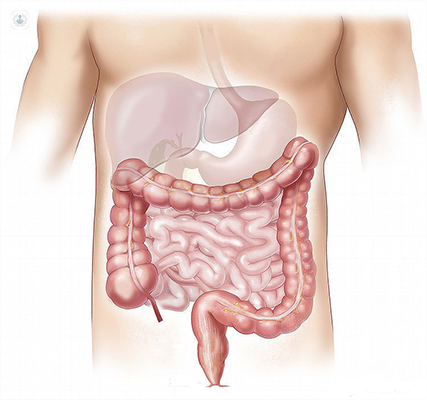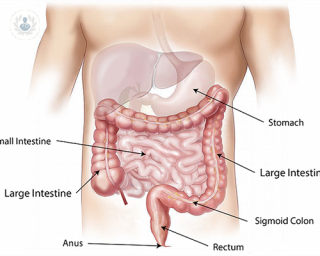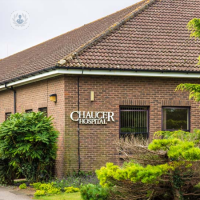What is bowel cancer screening?
Screening aims to determine whether healthy people show any early signs of bowel cancer. Bowel cancer is a common form of cancer for men and women, with approximately 1 in 20 people experiencing it in their lifetime in the UK. Detecting early signs of risk for bowel cancer can ultimately save lives. Bowel cancer in its early stages is more likely to be treated successfully.
What does bowel cancer screening involve?
In the UK, people over the age of 60 are invited to be screened. Following this, you are invited every two years for screening until the age of 75. Screening involves home tests that detect blood in the stool. If you are registered with a GP in the UK, you will automatically be sent this home test after the age of 60.

Additionally, at age 55 you are invited for a one-off bowel scope screening test (also known as a flexible sigmoidoscopy) where a thin tube with a camera is used to examine the inside of the bowel. This test can detect polyps, which are small growths that could eventually turn into cancer. If polyps are detected, they can be removed.
Why is bowel cancer screening done?
Bowel cancer screening is offered because it can save lives by detecting early signs of bowel cancer, or your possible risk of developing it. The earlier it is detected, the more successful treatment is likely to be.
Preparation for bowel cancer screening:
For the bowel scope screening, a few weeks before the appointment you will be sent a small plastic pouch containing liquid to perform an enema before the test, as well as instructions on how to do this. On the day of the test you will need to use the enema kit. This will induce a bowel movement before the test. You will also need to wear a hospital gown for the test.
For the home test kit, no preparation is required.
What to expect during bowel cancer screening:
During a bowel scope screening, the camera tube is inserted gently into your bottom to check for polyps. This test is painless, but you might find it slightly uncomfortable. No anaesthesia is required. The test lasts just a few minutes and you return home soon after the test is finished.
The home test kit is for sending a small poo sample to be tested in a laboratory. You will receive instructions on how to take a stool sample with the kit.
What do abnormal results mean?
Following the bowel scope test, if polyps are found you are told immediately following the test. If polyps are found and removed but are not cancerous you might also be offered a colonoscopy to check for polyps elsewhere in the bowel. If cancerous polyps are found and removed, you will be referred to a bowel cancer specialist to discuss treatment.
A normal result from a home test kit would indicate no blood in your stool, with no further action required other than another home test kit in two years’ time. If blood is found in your stool sample you will be offered a colonoscopy to do a more thorough investigation.
Rilevazione del cancro del colon-retto
What is bowel cancer screening?
Screening aims to determine whether healthy people show any early signs of bowel cancer. Bowel cancer is a common form of cancer for men and women, with approximately 1 in 20 people experiencing it in their lifetime in the UK. Detecting early signs of risk for bowel cancer can ultimately save lives. Bowel cancer in its early stages is more likely to be treated successfully.
What does bowel cancer screening involve?
In the UK, people over the age of 60 are invited to be screened. Following this, you are invited every two years for screening until the age of 75. Screening involves home tests that detect blood in the stool. If you are registered with a GP in the UK, you will automatically be sent this home test after the age of 60.

Additionally, at age 55 you are invited for a one-off bowel scope screening test (also known as a flexible sigmoidoscopy) where a thin tube with a camera is used to examine the inside of the bowel. This test can detect polyps, which are small growths that could eventually turn into cancer. If polyps are detected, they can be removed.
Why is bowel cancer screening done?
Bowel cancer screening is offered because it can save lives by detecting early signs of bowel cancer, or your possible risk of developing it. The earlier it is detected, the more successful treatment is likely to be.
Preparation for bowel cancer screening:
For the bowel scope screening, a few weeks before the appointment you will be sent a small plastic pouch containing liquid to perform an enema before the test, as well as instructions on how to do this. On the day of the test you will need to use the enema kit. This will induce a bowel movement before the test. You will also need to wear a hospital gown for the test.
For the home test kit, no preparation is required.
What to expect during bowel cancer screening:
During a bowel scope screening, the camera tube is inserted gently into your bottom to check for polyps. This test is painless, but you might find it slightly uncomfortable. No anaesthesia is required. The test lasts just a few minutes and you return home soon after the test is finished.
The home test kit is for sending a small poo sample to be tested in a laboratory. You will receive instructions on how to take a stool sample with the kit.
What do abnormal results mean?
Following the bowel scope test, if polyps are found you are told immediately following the test. If polyps are found and removed but are not cancerous you might also be offered a colonoscopy to check for polyps elsewhere in the bowel. If cancerous polyps are found and removed, you will be referred to a bowel cancer specialist to discuss treatment.
A normal result from a home test kit would indicate no blood in your stool, with no further action required other than another home test kit in two years’ time. If blood is found in your stool sample you will be offered a colonoscopy to do a more thorough investigation.


Understanding Faecal Immunochemical Testing (FIT) and its role in bowel cancer detection
Mr Michael Machesney
2024-11-21
Mostrare di più


Preparing for a colonoscopy
Mr David McArthur
2024-11-20
A colonoscopy looks for changes inside your bowels and is a diagnostic procedure that can find what's causing symptoms in the area. There’s a certain amount of preparation required from patients. So, what's involved? Mr David McArthur, a leading general and colorectal surgeon in Birmingham, provides a detailed answer in this informative article. Mostrare di più


What’s the best way to test for colon cancer?
Mr David McArthur
2024-11-20
Colorectal cancer, also known as colon cancer or bowel cancer, can be a worrying prospect, especially as we get older. Regular screening is important, especially for those over the age of 60. But how do we test for colorectal cancer? Expert colorectal surgeon Mr David McArthur explains. Mostrare di più


Bowel cancer symptoms: What are the signs to look out for?
Dr Nick MacLeod
2024-11-19
Highly respected consultant clinical oncologist Dr Nick MacLeod discusses the most common symptoms of bowel cancer and reveals the associated risk factors in this informative article. Mostrare di più
Medici esperti in Rilevazione del cancro del colon-retto
-
Professor Stuart Bloom
GastroenterologiaEsperto in:
- Inflammatory bowel disease
- Intestino irritabile
- Malattie digestive
- Riflusso gastrico
- Intolleranze alimentari
- Rilevazione del cancro del colon-retto
-
Dr Adam Haycock
GastroenterologiaEsperto in:
- Rilevazione del cancro del colon-retto
- Riflusso gastrico
- Inflammatory bowel disease
- Intestino irritabile
- Colonoscopia
- Endoscopia
-
Mr Simon Radley
Chirurgia generaleEsperto in:
- Chirurgia ricostruttiva del pavimento pelvico
- Rilevazione del cancro del colon-retto
- Colonoscopia
- Endoscopia
- Ernia
- Laparoscopia urologica
-
Dr Richard Sarsam
GastroenterologiaEsperto in:
- Colonoscopia
- Sangue nelle feci
- Digestione difficile (Dispepsia)
- Capsula endoscopica
- Gastroscopia
- Rilevazione del cancro del colon-retto
-
Professor Pradeep Bhandari
GastroenterologiaEsperto in:
- Esofago di Barrett
- Riflusso gastrico
- Endoscopia
- Rilevazione del cancro del colon-retto
- Intestino irritabile
- Obesità
- Visualizzare tutti

The Physicians' Clinic
The Physicians' Clinic
14 Devonshire St, London W1G 7AE
No existe teléfono en el centro.
Se utilizzi questo numero di Top Doctors autorizzi al trattamento dei dati a fini statistici e commerciali. Per maggiori informazioni, leggi la nostra l’informativa sulla privacy
Top Doctors

The Chaucer Hospital - part of Circle Health Group
The Chaucer Hospital - part of Circle Health Group
Nackington Rd, Canterbury CT4 7AR,
No existe teléfono en el centro.
Se utilizzi questo numero di Top Doctors autorizzi al trattamento dei dati a fini statistici e commerciali. Per maggiori informazioni, leggi la nostra l’informativa sulla privacy
Top Doctors

The Harborne Hospital - part of HCA Healthcare
The Harborne Hospital - part of HCA Healthcare
Mindelsohn Way, B15 2FQ
No existe teléfono en el centro.
Se utilizzi questo numero di Top Doctors autorizzi al trattamento dei dati a fini statistici e commerciali. Per maggiori informazioni, leggi la nostra l’informativa sulla privacy
Top Doctors
-
The Physicians' Clinic
14 Devonshire St, London W1G 7AE, Central LondonEsperto in:
- Cardiologia
- Dermatologia
- Gastroenterologia
- Neurologia
- Reumatologia
-
The Chaucer Hospital - part of Circle Health Group
Nackington Rd, Canterbury CT4 7AR,, CanterburyEsperto in:
- Anca
- Cataratta
- Chirurgia ortopedica
- Oftalmologia
- Ginocchio
-
The Harborne Hospital - part of HCA Healthcare
Mindelsohn Way, B15 2FQ, BirminghamEsperto in:
- Apparato digestivo
- Tumori
- Chirurgia ortopedica
- Chirurgia Toracica
- Diagnostica per immagini
- Ginecologia e Ostetricia







